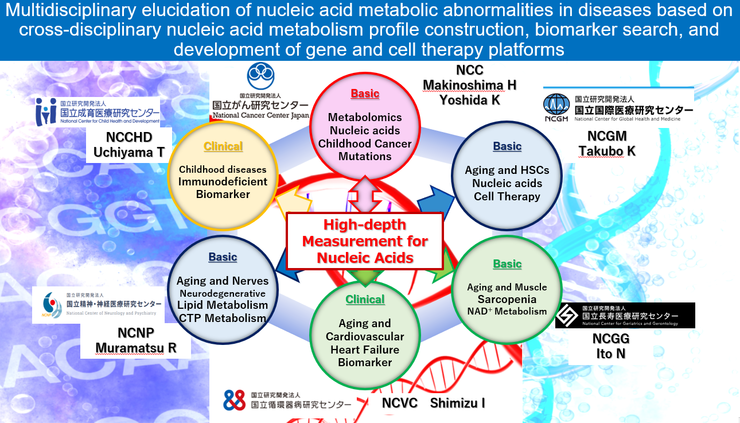Multidisciplinary elucidation of nucleic acid metabolic abnormalities in diseases based on cross-disciplinary nucleic acid metabolism profile construction, biomarker search, and development of gene and cell therapy platforms
Abstract
Nucleic acid metabolic abnormalities are associated with carcinogenesis, cancer progression, inborn errors of metabolism, immunodeficiency, aging, heart failure, neurodegenerative diseases, muscle diseases, cell differentiation, and stem cell stress responses. Advances in molecular biology have led to advances in disease onset mechanisms and the development of therapeutic methods, leading to further subdivision of diseases. However, cross-sectional disease research based on the common molecular mechanisms and modalities of nucleic acid metabolic abnormalities has not been developed to date.Research subjects range from cancers associated with genetic mutations and congenital childhood diseases to cancers mainly caused by aging, cardiovascular diseases, neurological diseases, and muscular diseases, and are maintained by researchers affiliated with the National Center (NC). We conduct cross-sectional disease research from the perspective of nucleic acid metabolism by quantifying nucleic acid-related metabolites with high sensitivity using clinical specimens, animal models, and cell models. As a result, we will construct nucleic acid metabolite profiles, which will lead to the discovery of metabolic biomarkers and the development of gene and cell therapy methods. Nucleic acids are held in all living organisms because they are responsible for preserving genetic information and expressing genes, and analysis of low-molecular nucleic acid profiles is likely to help elucidate the true nature of various diseases. We will share high-depth measurement technology for nucleic acid metabolites among NCs and construct nucleic acid metabolite profiles using patient-derived samples and disease model samples. It is assumed that these metabolites include the discovery of nucleic acid substances that retain new functions, nucleic acid substances that are useful for definitive diagnosis of diseases, and metabolic biomarkers that can predict the effects of treatments. Basic researchers use samples derived from disease models to conduct research centered on Proof of Concept (POC) biomarker candidates, and clinicians use clinical specimens to conduct research that can provide feedback to patients. We will consider lung cancer, primary combined immunodeficiency, cardiovascular disease, and aging-related diseases as candidates for metabolic biomarker development. Furthermore, we will perform metabolome analysis of samples related to purine/pyrimidine metabolic disorders stored in the 6NC Biobank, with the aim of constructing a cross-sectional metabolic profile.
Image
Perspectives
The department you go to differs depending on the disease or organ with the symptoms, medical research is divided vertically due to its highly specialized content, just as when you go to a hospital. For this reason, there are few opportunities to hear about other research fields during conference presentations or research papers. In this cross-sectional research promotion project at JH, we are able to study various diseases and disease models using the common keyword of nucleic acid metabolites, so it is expected that we will be able to develop research from a new perspective that has never been seen before. The goal is not only to publish the research paper about nucleic acid metabolite profiles that we construct, but also to register them in databases so that they can be accessed by as many people as possible.
Comments from principal researcher
Hideki Makinoshima
National Cancer Center, Advanced Medical Development Center, Unit Director

Cancer is characterized by active cell proliferation, with active sugar metabolism for energy production and active biosynthesis of proteins, lipids, and nucleic acids, which are the building blocks of cells. Until now, there is little experience in analyzing the metabolome of other diseases, but especially when analyzing disease models of aging, neurological diseases, and cardiac diseases, the metabolic characteristics are significantly different from those of cancer. Although it is difficult to understand and interpret metabolic changes, I would like to do my best in this research from a new perspective for the sake of patients.
Shared Researchers
National Center for Geriatrics and Gerontology
Geroscience Research Center
Naoki Ito
National Center for Child Health and Development
Developmental Genetics Research Department
Toru Uchiyama
National Cerebral and Cardiovascular Center
Cardiovascular Aging Control Department
Ippei Shimizu
National Center for Global Health and Medicine
Biohomeostasis Project
Keiyo Takubo
National Center of Neurology and Psychiatry
Neuropharmacology Research Department, Neurological Research Institute
Rieko Muramatsu
National Cancer Center
Research Institute Cancer Progress Research Division
Kenichi Yoshida

